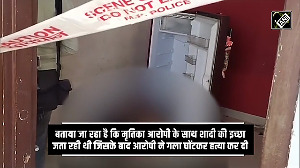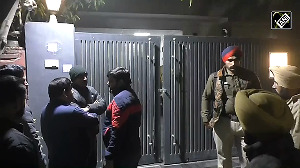Amid uncertainty over the mini-ministerial meeting starting today, the two powerful trade chiefs of the United States and the European Union sought India's assistance to break the deadlock over sectoral tariff elimination and the anti-concentration provision in return for supporting New Delhi's demand on enhanced flexibilities for special products and special safeguard mechanism, Business Standard was told.
In separate meetings with Commerce Minister Kamal Nath, US trade representative Ambassador Susan Schwab and EU trade commissioner Peter Mandelson requested India to help bring consensus on the sectoral tariff elimination ("which is basically the US baby") and the anti-concentration provision that have now become the deal-breakers due to fierce opposition from many developing countries.
While the US wants zero tariffs in sectors like chemicals, automobiles, health-related equipment and so on, the EU at the behest of the German industry is desperate that there has to be a robust anti-concentration provision that places a trigger on how many sensitive industrial products in each HS chapter can be subject to flexibilities under paragraph seven in the non-agriculture market access text.
Nath told the US and the EU categorically that India would not support both the issues on the ground that they are not only inconsistent with the Doha mandate but also undermine the developmental dimension of the Doha agenda.
He also hit out at numerous flexibilities provided to the industrialised countries in the latest agriculture draft text, arguing that India's future export interests in fruit and vegetables, dairy products and sugar will suffer if these exceptions are allowed to continue.
Apparently, Schwab said Washington had supported India's demand on special products despite opposition from several domestic lobbies, suggesting that New Delhi can reciprocate on the sectoral tariff elimination.
India also pressed the US to provide enhanced market-opening for its services providers under Mode 4, a demand that failed to elicit an encouraging response from the US trade chief, sources said.
New Delhi also conveyed that irrespective of the outcome in the modalities by the end of this week, it will press ahead for effective cuts in the overall trade-distorting domestic support, especially for sharp reductions in the huge water between the current applied levels of farm subsidies of US $7 billion that distort global trade and the range between US $13 and $16.4 billion as provided for the US in the latest draft text.
Along with India, China too hardened its stance on several issues, especially in agriculture by adopting uncompromising positions on special products and special safeguard mechanism, trade negotiators said.
While the actual negotiations will start today among trade ministers, Brazil's Foreign Minister Celso Amorim suggested that due to many unresolved issues, the ministerial meeting might not end with an outcome. He also urged that there has to be renewed texts for making more progress.
New Zealand's trade minister Phil Goff said members cannot afford to miss this opportunity to conclude the modalities in Doha agriculture and market-access for industrial goods, suggesting that a successful outcome is almost there.







 © 2025
© 2025